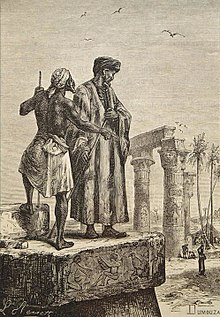Ibn Batutta
| Ibn Battuta | |
|---|---|

Book illustration by Léon Benett published in 1878 showing Ibn Baṭṭūṭah (right) in Egypt.
|
|
| Native name | أبو عبد الله محمد بن عبد الله اللواتي الطنجي بن بطوطة |
| Born | 25 February 1304 Tangier, Morocco |
| Died | 1369 (aged 64–65) Morocco |
| Occupation | geographer, explorer |
| Era | Medieval era |
Muhammad Ibn Battuta or Ibn Baṭūṭah (/ˌɪbənbætˈtuːtɑː/; Arabic: محمد ابن بطوطة); February 25, 1304 – 1368 or 1369), fully ʾAbū ʿAbd al-Lāh Muḥammad ibn ʿAbd al-Lāh l-Lawātī ṭ-Ṭanǧī ibn Baṭūṭah (أبو عبد الله محمد بن عبد الله اللواتي الطنجي بن بطوطة), was a medieval Moroccan traveller and scholar, who is widely recognised as one of the greatest travellers of all time. He is known for his extensive travels, accounts of which were published in his Travels (Rihla). Over a period of thirty years, Ibn Battuta visited most of the known Islamic world as well as many non-Muslim lands. His journeys included trips to North Africa, the Horn of Africa, West Africa, Middle East, India, Central Asia, Southeast Asia and China.
All that is known about Ibn Battuta's life comes from the autobiographical information included in the account of his travels, which records that he was of Berber descent, born into a family of Islamic legal scholars in Tangier, Morocco, on 25 February 1304, during the reign of the Marinid dynasty. He claimed descent from a Berber tribe known as the Lawata. As a young man he would have studied at a Sunni Maliki madh'hab (Islamic jurisprudence school), the dominant form of education in North Africa at that time. Maliki Muslims requested Ibn Battuta serve as their religious judge as he was from an area where it was practised.
...
Wikipedia
